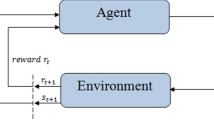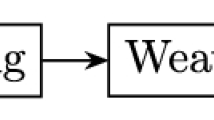Abstract
A novel scheduling problem that results from the addition of resource-assignable setups is presented in this paper. We consider an unrelated parallel machine problem with machine and job sequence-dependent setup times. The new characteristic is that the amount of setup time does not only depend on the machine and job sequence but also on the amount of resources assigned, which can vary between a minimum and a maximum. The aim is to give solution to real problems arising in several industries where frequent setup operations in production lines have to be carried out. These operations are indeed setups whose length can be reduced or extended according to the amount of resources assigned to them. The objective function considered is a linear combination of total completion time and the total amount of resources assigned. We present a mixed integer program (MIP) model and some fast dispatching heuristics. We carry out careful and comprehensive statistical analyses to study what characteristics of the problem affect the MIP model performance. We also study the effectiveness of the different heuristics proposed.
Similar content being viewed by others
References
Allahverdi A, Gupta JND, Aldowaisan T (1999) A review of scheduling research involving setup considerations. OMEGA Int J Manag Sci 27(2):219–239
Allahverdi A, Ng CT, Cheng TCE, Kovalyov MY (2008) A survey of scheduling problems with setup times or costs. Eur J Oper Res 187(3):985–1032
Balakrishnan N, Kanet JJ, Sridharan SV (1999) Early/tardy scheduling with sequence dependent setups on uniform parallel machines. Comput Oper Res 26(2):127–141
Biggs D, De Ville B, and Suen E (1991) A method of choosing multiway partitions for classification and decision trees. J Appl Stat 18(1):49–62
Chen J-F (2006) Unrelated parallel machine scheduling with secondary resource constraints. Int J Adv Manuf Technol 26(3):285–292
Cheng TCE, Sin CCS (1990) A state-of-the-art review of parallel machine scheduling research. Eur J Oper Res 47(3):271–292
Graham RL, Lawler EL, Lenstra JK, Rinnooy Kan AHG (1979) Optimization and approximation in deterministic sequencing and scheduling: a survey. Ann Discrete Math 5:287–326
Grigoriev E, Sviridenko M, Uetz M (2007) Unrelated parallel machine scheduling with resource dependent processing times. Math Program Ser A and B 110(1):209–228
Guinet A (1991) Textile production systems: a succession of non-identical parallel processor shops. J Oper Res Soc 42(8):655–671
Guinet A, Dussauchoy A (1993) Scheduling sequence dependent jobs on identical parallel machines to minimize completion time criteria. Int J Prod Res 31(7):1579–1594
Horn WA (1973) Minimizing average flow time with parallel machines. Oper Res 21(3):846–847
Kass GV (1980) An exploratory technique for investigating large quantities of categorical data. Appl Stat 29(2):119–127
Kim DW, Kim KH, Jang W, Chen FF (2002) Unrelated parallel machine scheduling with setup times using simulated annealing. Robot Comput-Integr Manuf 18(3–4):223–231
Lam K, Xing W (1997) New trends in parallel machine scheduling. Int J Oper Prod Manage 17(3):326–338
Lee YH, Pinedo M (1997) Scheduling jobs on parallel machines with sequence dependent setup times. Eur J Oper Res 100(3):464–474
Marsh JD, Montgomery DC (1973) Optimal procedures for scheduling jobs with sequence-dependent changeover times on parallel processors. AIIE Technical Papers, pp 279–286
Mokotoff E (2001) Parallel machine scheduling problems: a survey. Asia-Pac J Oper Res 18(2):193–242
Morgan JA, Sonquist JN (1963) Problems in the analysis of survey data and a proposal. J Am Stat Assoc 58:415–434
Ng CT, Edwin Cheng TC, Janiak A, Kovalyov MY (2005) Group scheduling with controllable setup and processing times: minimizing total weighted completion time. Ann Oper Res 133:163–174
Nowicki E, Zdrzalka S (1990) A survey of results for sequencing problems with controllable processing times. Discrete Appl Math 26(2–3):271–287
Pinedo M (2002) Scheduling: theory, algorithms, and systems, 2nd edn. Prentice Hall, Upper Saddle
Rabadi G, Moraga RJ, Al-Salem A (2006) Heuristics for the unrelated parallel machine scheduling problem with setup times. J Intell Manuf 17(1):85–97
Radhakrishnan S, Ventura JA (2000) Simulated annealing for parallel machine scheduling with earliness-tardiness penalties and sequence-dependent set-up times. Int J Prod Res 38(10):2233–2252
Ruiz R, Sivrikaya Şerifoğlu F, Urlings T (2008) Modeling realistic hybrid flexible flowshop scheduling problems. Comput Oper Res 35(4):1151–1175
Sivrikaya-Serifoglu F, Ulusoy G (1999) Parallel machine scheduling with earliness and tardiness penalties. Comput Oper Res 26(8):773–787
Webster ST (1997) The complexity of scheduling job families about a common due date. Oper Res Lett 20(2):65–74
Weng MX, Lu J, Ren H (2001) Unrelated parallel machines scheduling with setup consideration and a total weighted completion time objective. Int J Prod Econ 70(3):215–226
Yang W-H, Liao C-J (1999) Survey of scheduling research involving setup times. Int J Syst Sci 30(2):143–155
Zhang F, Tang GC, Chen ZL (2001) A 3/2-approximation algorithm for parallel machine scheduling with controllable processing times. Oper Res Lett 29(1):41–47
Zhu Z, Heady R (2000) Minimizing the sum of earliness/tardiness in multi-machine scheduling: a mixed integer programming approach. Comput Ind Eng 38(2):297–305
Author information
Authors and Affiliations
Corresponding author
Rights and permissions
About this article
Cite this article
Ruiz, R., Andrés-Romano, C. Scheduling unrelated parallel machines with resource-assignable sequence-dependent setup times. Int J Adv Manuf Technol 57, 777–794 (2011). https://doi.org/10.1007/s00170-011-3318-2
Received:
Accepted:
Published:
Issue Date:
DOI: https://doi.org/10.1007/s00170-011-3318-2




